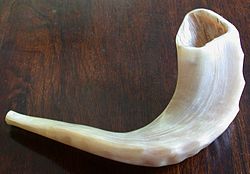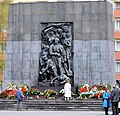Portal:Judaism
The Judaism PortalJudaism (Hebrew: יַהֲדוּת, romanized: Yahăḏūṯ) is an Abrahamic, monotheistic, ethnic religion that comprises the collective spiritual, cultural, and legal traditions of the Jewish people. Religious Jews regard Judaism as their means of observing the Mosaic covenant, which was established between God and the Israelites, their ancestors. The religion is considered one of the earliest monotheistic religions. Jewish religious doctrine encompasses a wide body of texts, practices, theological positions, and forms of organization. Among Judaism's core texts is the Torah—the first five books of the Hebrew Bible—and a collection of ancient Hebrew scriptures. The Tanakh, known in English as the Hebrew Bible, has the same books as Protestant Christianity's Old Testament, with some differences in order and content. In addition to the original written scripture, the supplemental Oral Torah is represented by later texts, such as the Midrash and the Talmud. The Hebrew-language word torah can mean "teaching", "law", or "instruction", although "Torah" can also be used as a general term that refers to any Jewish text or teaching that expands or elaborates on the original Five Books of Moses. Representing the core of the Jewish spiritual and religious tradition, the Torah is a term and a set of teachings that are explicitly self-positioned as encompassing at least seventy, and potentially infinite, facets and interpretations. Judaism's texts, traditions, and values strongly influenced later Abrahamic religions, including Christianity and Islam. Hebraism, like Hellenism, played a seminal role in the formation of Western civilization through its impact as a core background element of early Christianity. (Full article...) Selected ArticleCongregation Beth Elohim is a Jewish Reform congregation located in the Park Slope neighborhood of Brooklyn, New York. Founded in 1861 as a more liberal breakaway from Congregation Baith Israel, in its first 65 years it attempted four mergers with other congregations, including three with Baith Israel, all of which failed. The congregation completed its current Classical Revival synagogue building in 1910 and its "Jewish Deco" (Romanesque Revival and Art Deco) Temple House in 1929. The congregation went through difficult times during the Great Depression, and the bank almost foreclosed on its buildings in 1946. Membership dropped significantly in the 1930s because of the Depression, and again in the 1970s as a result of demographic shifts. Programs for young children helped draw Jewish families back into the neighborhood and revitalize the membership. By 2006 Beth Elohim had over 1000 members, and, as of 2008, it was the largest Reform congregation in Brooklyn, the "oldest Brooklyn congregation that continues to function under its corporate name", and its pulpit was the oldest in continuous use in any Brooklyn synagogue. (Read more...) Did You Know?Did you know...
Related Categories
Featured Articles
Related PortalsHistory ArticleTemple Israel is a Reform Jewish congregation in Memphis, Tennessee. It is the only Reform synagogue in Memphis, the oldest and largest Jewish congregation in Tennessee, and one of the largest Reform congregations in the United States. It was founded in 1853 by mostly German Jews as Congregation B'nai Israel. Led initially by cantors, in 1858 it hired its first rabbi, Jacob Peres, and leased its first building, which it renovated and eventually purchased. The synagogue was one of the founding members of the Union for Reform Judaism. It experienced difficulty during the Great Depression—membership dropped, the congregational school was closed, and staff had their salaries reduced—but conditions had improved by the late 1930s. In 1943 the synagogue changed its name to Temple Israel, and by the late 1940s membership had almost doubled from its low point in the 1930s. Rabbi Jimmy Wax became known for his activism during the Civil Rights era. In 1976 the congregation constructed its current building, closer to where most members lived. Wax retired in 1978, and was succeeded by Harry Danziger, who brought traditional practices back to the congregation. He retired in 2000, and was succeeded by Micah Greenstein. As of 2010[update], Temple Israel has almost 1,600 member families. Greenstein is the senior rabbi, and the cantor is John Kaplan. (Read more...) Picture of the Week A chart for the Counting of the Omer, depicting the number of days in the omer (top) and its equivalent in number of weeks (middle) and days (bottom) In the News
Featured Quote
WikiProjectsThings You Can Do
Weekly Torah PortionEmor (אמור)
Leviticus 21:1–24:23
“You shall not profane My holy name, that I may be sanctified in the midst of the Israelite people — I the Lord who sanctify you, I who brought you out of the land of Egypt to be your God." (Leviticus 22:32–33.)
 God told Moses to tell the priests these laws for the priests. None were to come in contact with a dead body except for that of his closest relatives: his parent, child, brother, or virgin sister. They were not to shave any part of their heads or the side-growth of their beards or gash their flesh. They were not to marry a harlot or divorcee. The daughter of a priest who became a harlot was to be executed. The High Priest was not to bare his head or rend his vestments. He was not to come near any dead body, even that of his father or mother. He was to marry only a virgin of his own kin. No disabled priest could offer sacrifices. He could eat the meat of sacrifices, but could not come near the altar. No priest who had become unclean could eat the meat of sacrifices. A priest could not share his sacrificial meat with lay persons, persons whom the priest had hired, or the priest’s married daughters, but the priest could share that meat with his slaves and widowed or divorced daughters. Only animals without defect qualified for sacrifice. God told Moses to instruct the Israelites to proclaim the following sacred occasions:
God told Moses to command the Israelites to bring clear olive oil for lighting the lamps of the Tabernacle regularly, from evening to morning. And God called for baking twelve loaves to be placed in the Tabernacle every Sabbath, and thereafter given to the priests, who were to eat them in the sacred precinct. A man with an Israelite mother and an Egyptian father got in a fight, and pronounced God’s Name in blasphemy. The people brought him to Moses and placed him in custody until God’s decision should be made clear. God told Moses to take the blasphemer outside the camp where all who heard him were to lay their hands upon his head, and the whole community was to stone him, and they did so. God instructed that anyone who blasphemed God was to be put to death. Anyone who killed any human being was to be put to death. One who killed a beast was to make restitution. And anyone who maimed another person was to pay proportionately (in what has been called lex talionis). Hebrew and English Text TopicsAssociated WikimediaThe following Wikimedia Foundation sister projects provide more on this subject:
Discover Wikipedia using portals | |||||||||



























